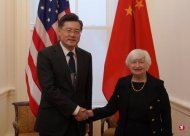The United States Ambassador to Japan, Emmanuel, said that the United States will not engage in the work of helping the company's chip producer, and the White House is increasing its efforts to prevent China from obtaining American technology.
Bloomberg reported that Rahm Emanuel said on Monday (December 19) in an interview with Bloomberg TV, "We are not engaged in funding and support business, nor do we engage in hard workWork and research to help you compete with us. "
The Bayeng government listed dozens of Chinese technology companies in the so -called physical list last week, which makes them almost unlikely to purchase key foreign partsAnd exacerbating trade conflicts between the world's two major economies.A spokesman for the Chinese Embassy in Washington criticized that the US move was "rough targeting" Chinese companies.
In the past two months, the United States has adopted the most powerful measures so far to prevent China from buying or making cutting -edge semiconductors.This is essential for China to surpass the United States in the fields of artificial intelligence and super computing.Bloomberg reported earlier that the main allies including the Netherlands and Japan will also join the ranks of the United States, planning at least some measures launched by the United States.
Emmanuel said that the United States and Japan are complementary in semiconductor.Japan announced a new security strategy last Friday (16th), which has planned a plan to greatly increase national defense expenses and call China a "unprecedented" strategic challenge.
The President of TSMC Wei Zhe's house last Saturday (17th) mentioned the danger of government excessive export control, saying that it would weaken mutual trust between the government.As customers and major governments are increasingly worried that the production of world chips is too concentrated in Taiwan, this multi -produced chip manufacturer is currently building factories in Arizona and Japan.
Wei Zhe's family said in an industry activity in Taipei last Saturday that "export control and the ban on products of other countries destroyed the productivity and efficiency brought by globalization, or at least reduce the benefits of the free market brought by the free market.... The most terrible thing is that mutual trust and cooperation between the country is beginning to weaken. "


